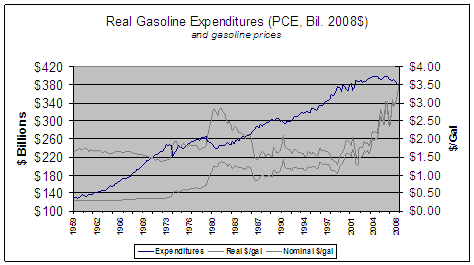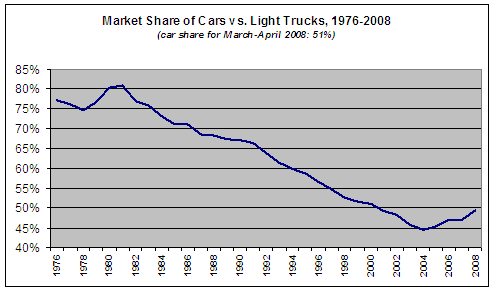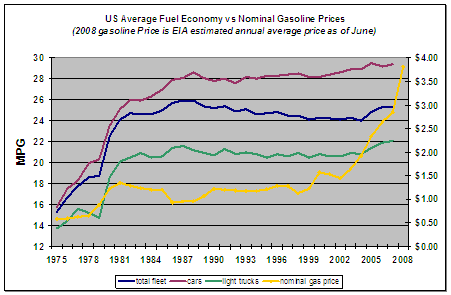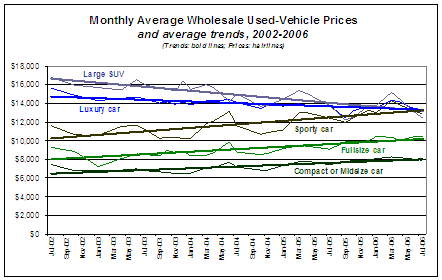There’s been a lot of discussion recently about the effects of high gasoline prices on the quantity demanded of gasoline, as well driving behavior (Jim Hamilton, Jim Hamilton, CR, CR, Paul Krugman). David Austin, whose work I have cited often on this blog, gave a fascinating presentation, entitled “Effects of Gasoline Prices on Driving Behavior and Vehicle Choice” at the recent Society of Government Economists conference in Washington, DC a couple of weeks ago. In it, he tackles some of these issues. (Note, these are his own personal views and do not necessarily represent the views of any specific organization.)
I could discuss each of the graphs in detail, but I think I will let them speak for themselves.

Figure 1: Gasoline consumption has declined as prices have increased. Source: D. Austin, Presentation at SGE, June 2, 2008.

Figure 2:With Higher Gasoline Prices, a Historic Shift in Vehicle Choice. Source: D. Austin, Presentation at SGE, June 2, 2008.

Figure 3:As Gas Prices Doubled (+ $1.50) Fuel Economy Increased by 1 mpg (Helped by higher CAFE standards for light trucks). Source: D. Austin.

Figure 4:Evidence from used-car market. Source: D. Austin, Presentation at SGE, June 2, 2008.
In the presentation, he also analyzes responses in the areas of volume and speed of freeway traffic, rail-transit ridership, and market share of cars vs light trucks.
Some discussion of these issues can be found in this document: Effects of Gasoline Prices on Driving Behavior and Vehicle Markets (January 2008).
As one who has worked in the car business for the last fifteen years, I have never seen a drop in value like large SUVs have seen in the last few months. The graph above does not come close to showing the volatility. A typical 3-5 year old Expedition has lost about 5-7k in value in just the last few months.
I fielded a phone pop yesterday from a woman needing a vehicle with three rows of seats. I suggested a minivan and got the typical response. No vans. She wants an SUV. She then had the ignorance to ask me if an Expedition got good fuel economy. Being in a somewhat surly mood, I said, uh, no, instead of asking what she considered good fuel economy. She will most likely buy an Expedition from someone willing to say, ya, it gets great mileage.
If you ever want to ruin your view that consumers behave rationally, just spend a few days with me.
One thing I have noticed over the last six months is that the nominal price of gas does not seem to have the influence over behavior as the volatility of the price. As long as the price is moving, people are not buying but watching. Once it stops moving for a week, things begin to return to normal.
Good story, hitchiker. It was interesting to leave Madison (where there are numerous Priuses and relatively few minivans) and go to the suburbs of Memphis last weekend. the roads were filled with low-fuel economy SUVs (and more than a few of those SUVs had W stickers on the back). And I bet those folks are the ones complaining the most about gas prices, while not doing anything in their habits to change it.
The adjustment will be long, as far too many Americans are not smart enough to adjust their behavior to mrket signals. I can’t see SUV and other big truck-type vehicle sales turning around any time soon, and we’ll see if it also coincides with a drop in suburban home prices, as people choose to spend less on commuting. This will not be pretty, and it won’t be over by 2009.
As for long adjustment, as far as I can tell:
So far, ignoring the speculative jiggles, what we’re seeing is mostly demand shock:
Other oil importers like China & India have now gotten enough well-off people to afford vehicles, fly more, etc.
Likewise, some oil exporters have developed enough to make more internal use of oil.
There seems no reason to expect such demand to go away, even if rising prices damp it somewhat. Oil is still cheap.
But the long-term supply shock [the petroleum geologists’ piece of this] hasn’t really gotten going yet in any serious way, since world conventional oil production seems to have flattened onto a plateau, but hasn’t really started going down yet.
Is the above a reasonable characterization?
Are there structural differences between:
– Demand shocks
– Supply shocks
– Simultaneous demand+supply shocks
– Any recommended papers or blog posts?
The wife drives a Buick Rendezvous. Great vehicle, 115K and never seen the inside of a shop. It gets 20-24 mpg. Can’t do much better and still carry 7 people. Lots of folks lambast SUV drivers when they see them driving in those big vehicles alone. Most don’t stop and think they may have to shuttle a football team or 6 kids around sometimes. I vote for increasing oil production and letting everyone conserve in ways they are able, not forcing lifestyle changes on others.
Check out this site; they are collecting support for S.2958. If you have not heard about S.2958 yet go there and read up on it. We need this.
http://www.AmericansForJobsAndEnergy.org/
SUVs certainly make sense in some cases.
As for S.2958, perhaps you can answer a question a friend’s 13-year-old asked him:
“Daddy: will you adults leave any oil for us?”
Your answer seems to be:
“not much, and almost none for your kids, because we’re going to do our best to find and use as much as possible soon.”
Another way of thinking is that we’ll drill in ANWR and the continental shelves sooner or later, but they ought to be considered piggy banks for later generations to use.
In any case, for ANWR, we might as well wait until the permafrost melts.
There isn’t much impact except on what is bought and used as goods shipment at a given time.
Way overblown hype. The bigger issue is deleveraging as markets crash.
“In any case, for ANWR, we might as well wait until the permafrost melts.”
ANWR won’t be drilled anytime soon. By the time we do drill it, we won’t be using for gas as auto’s won’t be powered by Oil by then. ANWR oil will be used for other oil based products.
The shutting down of current refinaries and building of sour crude refinaries is also going to happen in the coming years.
What about Italian Economy Minister words?
“Our proposal to clamp down speculation by raising deposits for traders in derivatives markets is just the beginning. However it’s a victory for us that in the communique there will be a call on the IMF to study the issue of rising oil prices and there will also be a reference to the possibility of national governments acting on markets.”
“After the IMF analysis on oil prices, the next step should be to impose a bigger deposit on (commodity) futures markets.” The sooner the better: we are suffering a problem of democratic consensus …
“Technically it is easy to raise deposits on futures markets to curb speculation but there is a conflict of interest to do it. There are countries that are victims of others.”
John states…
“As for S.2958, perhaps you can answer a question a friend’s 13-year-old asked him:
‘Daddy: will you adults leave any oil for us?’
Your answer seems to be:
‘not much, and almost none for your kids, because we’re going to do our best to find and use as much as possible soon.'”
Oil is a means to an end; it is not the end in itself.
Oil should be a bridge to a new technology.
Oil exploration, extraction, refining, and consumption are events that can occur with the development of new energy technology.
Drian America first!
To the tune of a BeachBoys song,
Drill, drill, drill,
Drill Anwar now.
Drive, drive, drive,
drive ya Humma now!
Drain America first!
S.2958 is a good idea. I am a lifelong democrat, and this is a good chance for the democrats to show they are sensible. Jane Fonda made a movie called the China Syndrome 30 years ago, which coincided with 3 mile island, which scared us out of the nuclear industry for the last 30 years. Oil drilling accidents off the California coasts some years ago caused us to shut down a lot of off shore exploration. The far left complains about Republican politics of fear (and they are justified in that, witness some of the fear tactics Karl Rove and company have used) But the far left also uses their own politics of fear. We have made huge strides in cleaning up air and water without serious damage to the economy. The oil companies have really improved their environmental safey, witness the fact there were no huge oil spills when Katrina tore up the gulf. Yes, we will not see that oil for several years, but one of the biggest factors in the speculative frenzy is fear of running short in the out years. Passing this bill will be a big factor in bursting the oil bubble.
RDM:
Let’s ignore any potential local environmental issues in ANWR and the coastal shelves. [Indeed, the safety record is better, although we still have trouble with oil tankers running into bridges in SF Bay.]
Given that, is your short-term plan to find and use as much oil as possible as soon as possible?
If so, what’s your plan for 2050-2100? [I.e., the period during which my friend’s grandchildren, if any, would be adults?]
Do you believe this is 100% speculative frenzy and 0% geophysics/petroleum engineering?
“And I bet those folks are the ones complaining the most about gas prices, while not doing anything in their habits to change it.”
Driving OR voting habits….
“Daddy: will you adults leave any oil for us?”
Daddy will you adults leave any whales for us? I’m scared we won’t have any way to make light at night.
Daddy will you adults leave any trees for us? I’m scared we won’t be able to keep the house warm in the winter.
Don’t worry kid its happeninmg all the time. Wait until you see the Medicare & Social Security bubble pop.
‘Daddy: will you adults leave any oil for us?’
My response to this snivelling little punk would be to highlight how much of his or her worthless little life was made effortless by all that oil.
It ticks me off that anyone thinks that oil is “ours”. The use of “us” in the above comment is silly.
Oil is a market commodity owned by certain people and sold to other people. It has been provided by a market at market prices. The use of oil has produced an economy and a society unimaginable to people of the pre-oil era.
And if we will really run out of oil in the next 50 or 100 years, well, we just need to get smarter and richer faster to insulate us from the downsides of the end of oil.
Isn’t it funny how a couple years of rising oil prices have done more to promote “alternative energy” than 30 years of government programs in an environment of cheap energy?
Do you think that markets might work? Geez, this is an economics blog, right?
Regarding the “end of the SUV”, I think the dumping of SUVs in a panic is indicative of shortsightedness. Nobody who does an honest assessment of their finances is going to sell a paid-for SUV at firesale prices to go out and buy a hybrid. The math just doesn’t work.
Now, if your SUV is totally worn out, sure, go buy the hybrid. Buying a new SUV if you don’t need its specific abilities (towing, mostly) would be foolish as well.
But for god’s sake, don’t be stupid! Too many people are dumping their SUVs, causing the used market to crater. Resale values are pathetic (but to be fair, I’ve noticed that even domestic cars are going for firesale prices. Maybe the recession is a factor as well).
Better to cut down on driving and make sure that you’re doing everything you can to maximize mileage. Getting more out of an existing asset gives the highest ROI.
As much as people complain about prices, some folks still don’t seem to get it and refuse to change their driving habits which can have an immediate impact on mileage. For instance, tailgating so close that it requires constant switching between the accelerator and brake, or flooring it once the light turns green. But it is true that consumption has fallen, so the combination of the economy and high prices is having an effect
Which do think would be more valuable: all the oil in ANWR in 50 years, or to pump and sell that oil now and put that money into a diversified fund to grow over the next 50 years?
There are alternatives to oil. Given enough energy you can manufacture gasoline from the CO2 in the air.
At 5% real return, an investment will grow 10 fold in 50 years. Do you really think that oil can be 10 times more expensive than it is now?
I also dislike the argument that we shouldn’t drill in ANWR now because the oil there will be more valuable in the future.
Like the enviros will allow drilling there EVER!
The issue is not drill now/ drill later. The issue is drill there or not. Right now, policy is that there will NEVER be drilling there!
“Isn’t it funny how a couple years of rising oil prices have done more to promote “alternative energy” than 30 years of government programs in an environment of cheap energy?”——
“alternative energy” has been suppressed for the last three decades by a Texas oilman and his friends/relatives in the White House. (SR. not JR.)
I don’t believe that they have much control these days on prices, but we wouldn’t be hit so hard if “alternative energy” use and MPG standards had been continued from their initiation 30 yrs ago. (Carter)
I don’t believe that they have much control these days on prices, but we wouldn’t be hit so hard if “alternative energy” use and MPG standards had been continued from their initiation 30 yrs ago. (Carter)
And we’d also be a LOT poorer had we done so.
I can’t believe how often commenters to this blog, not to mention one of the bog two posters, totally discount opportunity cost in their thinking.
The choice in 1995 was higher CAFE standards or the Pentium microprocessor. Which one do YOU think had the higher ROI?
How do you separate the 1990’s Internet Boom from the commodity collapse that happened as a result of the Asian fiscal crisis? Oil cost $10 a barrel in 1998.
Low energy prices allowed us to invest so much more in IT, which had such a high ROI, that we are many, many times richer than we would be in the alternative universe where Carter Energy Policy outlived his awful administration.
John Mashey
IF we still require liquid hydrocarbon fuels in 2050, I would think that shale oil and tar sands would still be available, plus liquefied coal. Your concern is valid in that we can have electric cars for ground transportation, but how do we fuel jets? Again shale oil, liquicoal, tar sands. Use the savings we will have by opening the OCS to incentivize those industries and alternate energy sources. Give the oil companies a fair return, plus X percent, but realize they will just milk the cow until it is dry, instead of developing alternative sources. BTW, I was watching CSPAN’s coverage of the global warming committe. Chairman Markey from Massachusetts is a jackass, and I can say that as a lifelong democrat. I really wanted to hear what the witnesses had to say, and he was just browbeating them.
So George Bush(es) have been inhibiting energy technology development for thirty years?
Where is the fleet of electric cars in France? They use “new-kew-ler” power? Do you suspect the engineers at Renault are just not as clever as our boys at Ford.
Hmmm. The pro-drilling forces are reduced to arguing that buying cars instead of SUVs would inhibit developing microprocessors. Guess it’s getting really hard to come up with reasons to drain American first.
If you really want to save money, stop building infrastructure for a cheap oil environment. The ridiculously low gas prices of the past 20-30 years haven’t saved us money, they’ve cost us trillions by encouraging production of low-density housing that’s going to be essentially useless within a decade.
Fair Economist, can you explain to me the concept of opportunity cost?
After you do that, can you tell me what we spent all that money on in the 1990’s that we were NOT spending on energy?
We didn’t all just buy Ford Explorers and little McMansions on the Prarie.
Further on the topic of missed opportunities to develop alternative energy sources, and the multinational corporations behind it:
Calling the US university system leftist might be name calling. Shame on me I did it anyway.
The professors and grad students have time, money, knowledge, skill and lab space to develop these projects. Does BP own MIT? If not, where has my hydrogen scooter been?
Reading the FairEconomists point:
If you really want to save money, stop building infrastructure for a cheap oil environment. The ridiculously low gas prices of the past 20-30 years haven’t saved us money, they’ve cost us trillions by encouraging production of low-density housing that’s going to be essentially useless within a decade
brought to mind an article yesterday on cnn.com about walkable urbanism and the demise of sprawling suburbia, which isn’t all oil prices, but does go in line with this discussion on many levels:
Is America’s Suburban Dream Collapsing into a Nightmare?
Here’s an Idea: Let base numerous core elements of our economic health not to mention personal mobility comfort and, in some instances, survival on a fuel that is known to be finite in supply. Once we have succeeded in establishing this economic time bomb we really must further enhance the inherent instability we have created by maintaining artificially low prices while building an ever more consumptive less efficient demand base. Finally we must take steps to dissuade any attempts to develop alternative sources for use in energy other product manufacture.
Oops, I am sorry, while ding in my fallout bunker I missed the success we have enjoyed as a country achieving all of these goals.
Now depending on the report and commentary yu like the most we have 60 years or so of our existing primary fuel source remaining. Somewhere along the way we clearly confused the word finite with inexhaustible, clearly they are close cousins.
The problems we are faced with today are both short term and long term in nature. Most immediately we face a sticky demand side issue where the elasticity of demand is well below 1. Overwhelming short term structural issues that cannot be immediately balanced with modified behavior.
In a longer term view both structural changes in consumption along with behavior modification will abate the impact of higher fuel costs to the consumer and relieve the constraining impact this has on the overall economy. What will not change is the finite nature of fossil fuels and our immediate need to develop serious next generation, renewable replacements.
Fortunately. or unfortunately -depending on your personal view, the price of fossil fuels is unlikely to decrease significantly for U.S. consumers as it has in the past. This is primarily a function of a shift in demand dynamics.
While overall U.S. consumption remains the highest in the world our consumption growth rate is relatively low. Other countries, most notably China and India now have overall consumption rates and very high growth rates that are the price determining factors. Simply put a good old fashion U.S. or even European pull back no longer has magnitude to cause overall decrease in demand and therefore lacks the pricing power.
Jared Diamond’s book “Guns, Germs and Steel” isn’t on my recommended reading list, but he has a fun item on the disappearance of North American megafauna.
In his estimation, it was an extremely short interval (a few hundred years) between the arrival of the first humans to NA and the extinction of mamoths and any other large edibles. Not being farmers, they were forced to the next best things, like bufalo and elk. EROEI decreased sharply from mamoth hunting to elk hunting, but somehow they survived.
Food innovation might make a good comparative study for energy innovation. The transitions from big animals, to little animals, to naturally occuring vegatables, to grains were each shifts to more complicated products that required planning, maintenance, processing and storage.
In a few decades, Meat:Grain::Gas:Batteries might apply.
I have a nissan xterra. I purchased it for a song and dance due to the high price of gas and it was a leftover. My payments are well under 300/month. Financially speaking it is still cheap to own even if gas rises to $5/gal. If I was to purchase a hybrid the savings in fuel cost would be easily overcome by the monthly note to own the hybrid.
I drive very conservatively and get 21mpg city and 26mpg hwy.